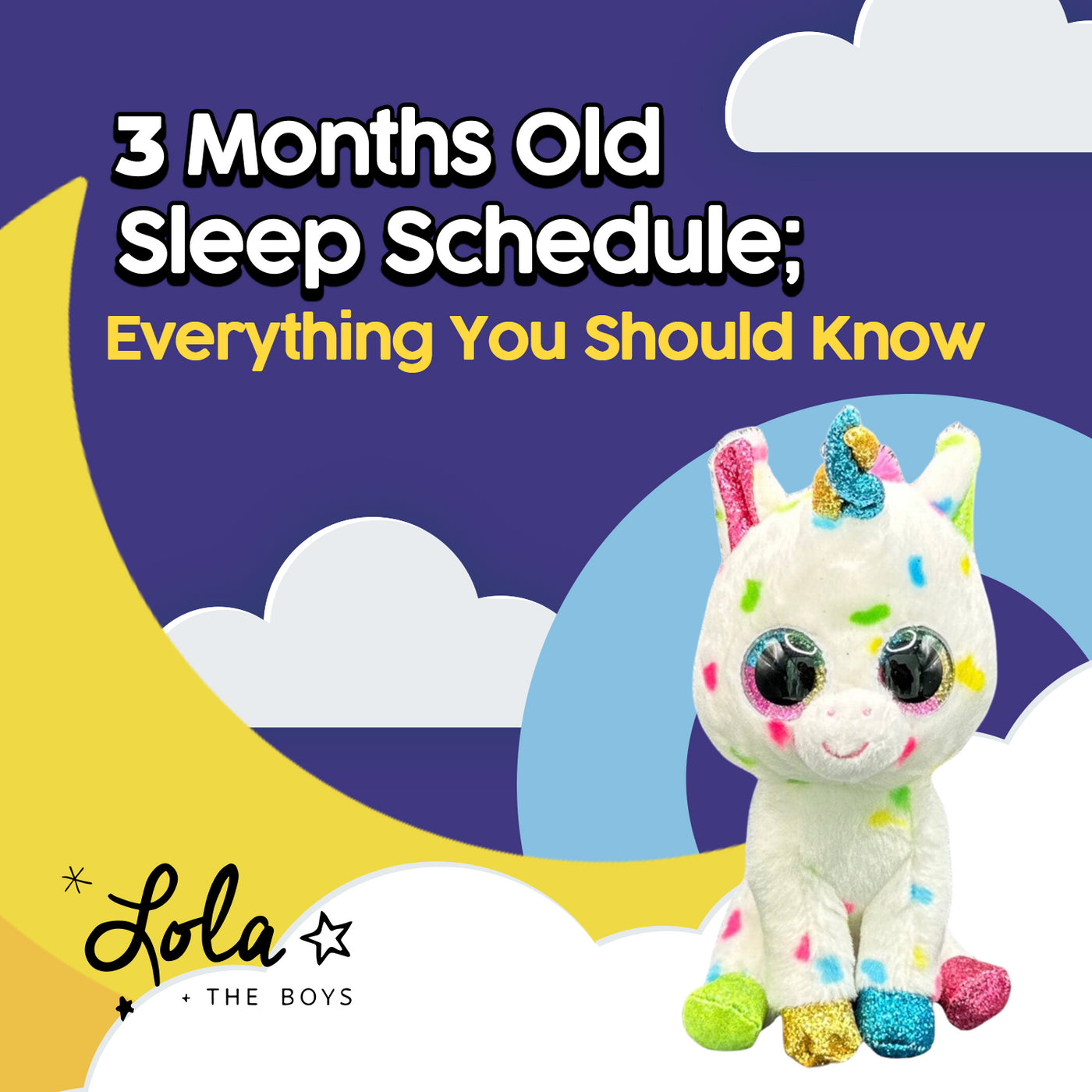Your Cart is Empty
3 Months Old Sleep Schedule; Everything You Should Know

If you're a new parent, you've likely come to realize the importance of a consistent sleep schedule for your baby's development. By establishing a regular sleep routine, you can provide a stable and nurturing environment that promotes optimal growth and health. When your baby consistently gets enough restful sleep, they wake up more refreshed, alert, and happier. A well-rested baby also leads to a happier, less stressed parent. By prioritizing your baby's sleep and creating a consistent sleep routine, you are investing in their overall health and well-being.
One of the most critical stages of your baby’s sleep development is the 3 months old sleep schedule. At this age, your baby’s sleeping pattern starts to become more regular, and that’s why it’s essential to form a healthy sleep pattern for them.
In this post, we will take an in-depth look at the 3 months old sleep schedule and everything that parents should know to ensure their babies’ restful and beneficial sleep.
How Much Sleep Do 3 Months Old Baby Need?
At 3 months old, newborns need about 14-17 hours of sleep every day, which includes naps and nighttime sleep. However, each baby's sleep needs may vary, and parents should observe and adjust their newborn sleep schedule accordingly.
Getting enough sleep is crucial for a baby's growth and development. During sleep, newborns' physical and mental development undergo rapid changes. While they sleep, their body produces growth hormones that affect their physical growth, cognitive function, and immune system. Therefore, parents need to prioritize establishing a consistent newborn sleep schedule to ensure their development.
Overall, as a parent, it's important to monitor your baby's sleep pattern, and you can do that by keeping a sleep diary or tracking their sleep times. By doing this, you can determine if they are getting enough sleep or if you need to make any adjustments to their newborn sleep schedule.
Understanding the Sleep Patterns of 3 Months Old
At 3 months old, your baby's sleep pattern may consist of around three naps during the day and longer night sleep with brief waking periods. Newborns typically have a deep sleep called Non-Rapid Eye Movement (NREM), which occupies about 50-60% of their sleeping time. On the other hand, the remaining 40-50% involves periods of lighter sleep called Rapid Eye Movement (REM) sleep, which is when dreaming occurs.
Understanding the difference between NREM and REM sleep is crucial for your newborn's development. NREM sleep helps the body recover, while REM sleep plays a vital role in cognitive development and memory consolidation. By comprehending the importance of both types of sleep, you can prioritize and create a sleep routine that promotes your baby's overall health and development.
As your baby grows, their sleep pattern will change, and they will gradually require less sleep time. Therefore, you should adjust your newborn sleep schedule accordingly and continue monitoring their sleep patterns to ensure they get the sleep they need to thrive.
3 Months Old Sleep Schedule
Creating a 3-month-old sleep schedule can be beneficial in establishing a routine for your baby. Here's what you can do to create a 3-month-old sleep schedule:
- Bedtime: Set a consistent bedtime between 7-8 pm, as most newborns sleep for a more extended period at night at this age.
- Naptimes: Plan for three naps per day that are consistent in time and length. These should typically be around 9 am, 12 pm, and 3 pm.
- Nighttime sleep: At three months, most babies sleep for a more extended period at night, around 8-10 hours.
- Total Sleep Time: At this age, your baby should typically be sleeping between 14-17 hours every day, including naps and nighttime sleep.
- Importance of Consistency: For the best 3 months old sleep schedule, it's essential to establish a consistent routine for your baby. You can do this by creating a sleep-friendly environment that is comfortable and suitable for sleeping. Consistency in timing and length of naps and bedtime can help your baby's body adjust to a sleep routine and eventually sleep through the night.
Here is a sample 3 months old sleep schedule chart:
| Time | Activity |
|---|---|
| 7 pm | Bedtime |
| 9-10 am | Afternoon Nap |
| 3-4 pm | Late Afternoon Nap |
| 7-8 am | Wake up time |
Overall, it's essential to remember that every baby's sleep needs vary; therefore, it's crucial to observe their sleep pattern and adjust their newborn sleep schedule accordingly. Over time, you will be able to establish a routine that works best for you and your baby.
Tips for Helping Your 3 Months Old Sleep
Establishing a consistent 3 months old sleep schedule is essential in ensuring your baby gets a good night's rest. Here are some helpful tips to help you and your baby achieve better sleep:
- Create a Sleep-Conducive Environment: Make sure your baby's sleeping space is quiet, comfortable, and at the right temperature. Keep the room dark, and use a white noise machine or a fan to drown out any external noise.
- Develop a Consistent Bedtime Routine: Creating a consistent routine before bed can help your baby associate certain activities with bedtime, signaling to their brain that it's time to sleep. Your baby's bedtime routine can include a warm bath, reading a storybook, cuddling, or singing a soothing lullaby. These activities can create a calm and relaxing environment, helping your baby wind down and fall asleep more quickly.
- Encourage Daytime Playtime: Encouraging your baby to play more during the day can help reduce their daytime nap length and improve sleep quality at night.
- Avoid Overstimulation: Overstimulation can make it challenging for your baby to fall asleep. Avoid loud noises, bright lights, and rough playtime before bedtime.
- Dressing Your Baby for Sleep. Dressing your baby appropriately for sleep can help ensure that they stay comfortable and maintain an optimal sleeping temperature. When deciding what to dress your baby in for sleep, consider the room temperature and the thickness and type of fabric of their sleepwear. Overdressing can lead to overheating and pose a risk for Sudden Infant Death Syndrome (SIDS), which is why it's essential to dress your baby in light and breathable clothing for sleep.
- Use Swaddling Techniques: Swaddling your baby can create a cozy and secure feeling that can help them sleep better. Use a lightweight and breathable swaddle to avoid overheating.
Establishing a 3 months old sleep schedule and ensuring that your baby is getting enough sleep is essential for their healthy growth and development. However, it's important to remember that every baby has unique sleep needs, and their sleep schedule may require adjustments. By maintaining patience and consistency, and incorporating creativity into your baby's bedtime routine, you can help them develop positive sleep habits that will benefit them in the long run. Remember, investing time and effort in your baby's sleep is an investment in their overall health and well-being.
Common Newborn Sleep Issues
While a consistent 3 months old sleep schedule and routine can help your baby get the sleep they need, there are some common sleep issues that newborns may experience. Here are some of the most common issues and tips for addressing them:
- Difficulty Falling Asleep: This is a common issue among newborns. To help your baby fall asleep faster, try offering a pacifier or introducing a soothing bedtime routine that includes a massage or a warm bath.
- Frequent Night Waking: Many newborns wake up frequently, either to feed or because they need a diaper change. To reduce the frequency of nighttime waking, make sure your baby is getting enough to eat during the day and try to reduce the need for diaper changes during the night.
- Reflux and Colic: Reflux and colic can make it challenging for your baby to sleep. To help with these issues, try keeping your baby upright after feeds, burp your baby often, and consider talking to your pediatrician about reflux medication or probiotics.
- Sleeping in Unsafe Positions: As a parent, it's essential to ensure that your baby is sleeping in a safe position to prevent sudden infant death syndrome (SIDS). The American Academy of Pediatrics recommends that babies sleep on their backs with no pillows or soft bedding.
Remember, addressing newborn sleep issues may take some time, patience, and experimentation. If you're concerned about your baby's sleep patterns, don't hesitate to talk to your pediatrician to rule out any underlying medical issues. A healthy 3 months old sleep schedule and routine can positively impact your baby's development and overall health.
Shop the Best Sleepwear for Your Baby at Lola and the Boys
At Lola and the Boys, we want to make sure your little one has the best sleep possible. That's why we offer high-quality sleepwear options that are not only cute but also comfortable and safe. Our sleepwear is made with premium materials that are gentle on your baby's delicate skin and designed to keep them at the perfect temperature for a restful night's sleep.
But that's not all! We also offer a variety of other kids' clothing options so that you can create a complete and stylish wardrobe for your child. From dresses to jackets, we have everything you need to dress your little one in the latest trends.
Don't just take our word for it, check out our reviews page to see what other parents are saying about our products. Shop now and give your baby the gift of a good night's sleep!
Final Thoughts
- Establishing a consistent 3 months old sleep schedule is crucial in ensuring that your baby gets the sleep they need for healthy growth and development. A sleep-friendly environment, a consistent bedtime routine, and regular observation of your baby's sleep patterns can help create a healthy sleep schedule that suits your family's needs.
- Remember that every baby's sleep needs vary, so don't be afraid to adjust your newborn sleep schedule and routine as needed. If you're experiencing issues with your baby's sleep, don't hesitate to talk to your pediatrician for guidance.
- As a parent, it's essential to prioritize your baby's sleep and create a routine that enables them to get enough restful and beneficial sleep each day. By doing so, you're helping to ensure their overall health and well-being.
- So, be consistent in establishing a 3 months old sleep schedule, provide a sleep-conducive environment, and monitor your baby's sleep patterns. With these steps in place, you can help your baby develop healthy sleep habits that will benefit them long-term.













